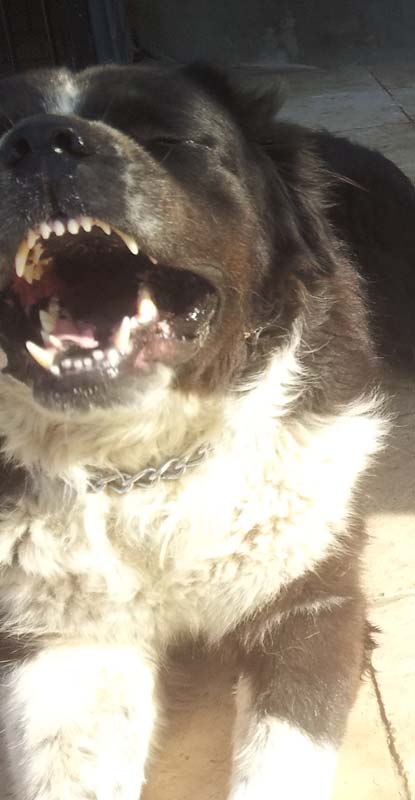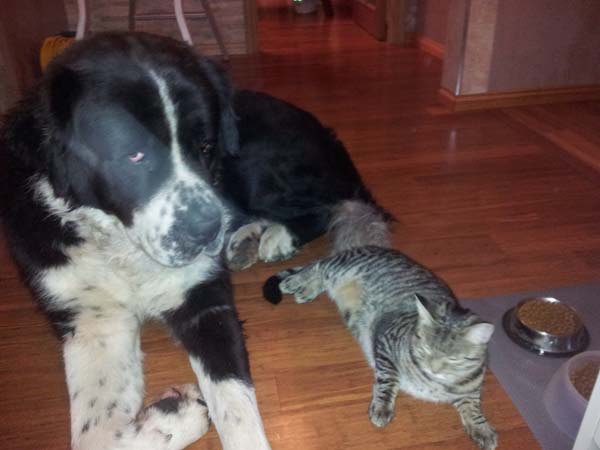Central Asian Shepherd Dog (Alabai) FAQ
CASD is predominantly a guard or watch dog and (as the name suggests) a shepherd. Historically their main use was protecting livestock against wolves and other predators (hence they are sometimes referred to as wolfhounds) as well as guarding property of their owner. Their active kennel breeding started only a few decades ago (late 20th century) after they were studied by Russian biologists and officially recognized as a breed. Around that time their popularity has grown rapidly and other uses have emerged. They started to be used as family pets, property guards and also as service dogs (e.g. by the police).
They rarely get sick. To the best of our knowledge and unlike many other pure breeds Central Asian Shepherd Dogs don't suffer from any hereditary diseases specific to the breed.
But if they do get sick they hardly show it (and here is the danger). They don't wine and whimper, they don't demand your immediate attention. They may become a bit lethargic or refuse food. But they keep working (i.e. protecting you and your property) even when they are sick! Often illness may pass unnoticed by the owner.
Central Asian Shepherd dogs easily live up to 15 years. There were cases reported when some dogs lived to 25 years.
CASD are smart and quite stubborn dogs. It is difficult to train them initially. They will use their intellect to try to avoid following your commands to start with. You have to be patient. However they tend to remember skills they learn for a very long time (often for their entire lifetime) so you patience will pay off. This is another amazing thing about them: once they learn they never forget! It is best to start the basic obedience training early when they are about 3 months old.
CASD are dogs with strong sex dimorphism. Males are significantly larger (up to 94cm vs. up to 78cm height at withers) and heavier (up to 82kg or even more vs. up to 64kg) than females. Bitches are more active and generally behave more like "normal" dogs: they tend to show their emotions readily. Females get alarmed more easily than males where as males are all independence and composure. Females show aggression when they are afraid or agitated. Males become aggressive when they get angry. Females are more alarmist, run around and bark at everything that moves outside (especially after dusk). So ostensibly they appear to be a better guard. Males generally come out when the "threat" is clear, e.g. someone comes close to the fence or tries to get in. It takes more to make a male CASD angry than a female. A good CASD male is expected to be fearless. They have quite high pain threshold which coupled with a strong nervous system makes them unsurpassed fighters.
Central Asian Shepherd Dogs are capable of planning their actions ahead and making decisions on their own. They don't need a human to be present on site for them to guard efficiently (most other breeds work well only when a man is around).
We believe they guard best when there're a few of them, e.g. a male and a female, or a in packs of several dogs since Central Asian Shepherd dogs are highly social animals. When guarding in packs they coordinate their activity: different dogs may cover different entrances making it hard to trick them.
We have to stress that all these natural abilities have to be properly developed. To become an effective guard dog a CASD has to be trained. One can proceed to guard training only after basic obedience course is fully completed. Specific guard training must also be conducted by an experienced professional trainer. Don't forget that CASD is a large and powerful animal. By nature they are not aggressive or dangerous to people. If aggression is to be developed then it must be adequately controlled.
No, Alabai is the colloquial name of the CASD breed used in Central Asia. The word "alabai" in Turkman language means rich with spots since it is actually comprised of two words: "ala" (spot) and "bai" (rich).
Yes, you can. CASD can adapt to many environments including an urban setting. We know of cases when CASD were raised in apartments and have grown to be beautiful dogs. However we would advise against that unless you are certain you can commit some time on a daily basis to work and exercise the dog.
Please feel free to contact us and we will answer your questions as soon as possible.


